Racism in Australia: Social Issues and Mitigation Strategies
VerifiedAdded on 2022/09/07
|7
|1733
|58
Essay
AI Summary
This essay delves into the complex issue of racism in Australia, examining its pervasive presence within the society. The essay highlights specific instances of discrimination, such as the segregation of Aboriginal people in hotels and healthcare settings, and the loss of culture and identity experienced by minority groups. It argues that these issues are deeply rooted in systemic and institutionalized racism, leading to disparities in access to education, healthcare, and government benefits. The essay then proposes solutions based on the principles of Christian Social Teaching (CST), emphasizing the importance of human dignity, solidarity, and the common good. It suggests that promoting these values through awareness campaigns and policy changes can help mitigate racism and foster a more just and equitable society. The essay emphasizes the need for preferential treatment for historically marginalized groups and the application of CST principles to create laws and policies that recognize human equality and integrity. The author believes that by implementing these strategies, Australia can make significant strides in reducing racism and promoting a society where all individuals are treated with respect and dignity. The essay concludes by emphasizing the importance of understanding and applying CST principles to foster a more just and equitable society in Australia.
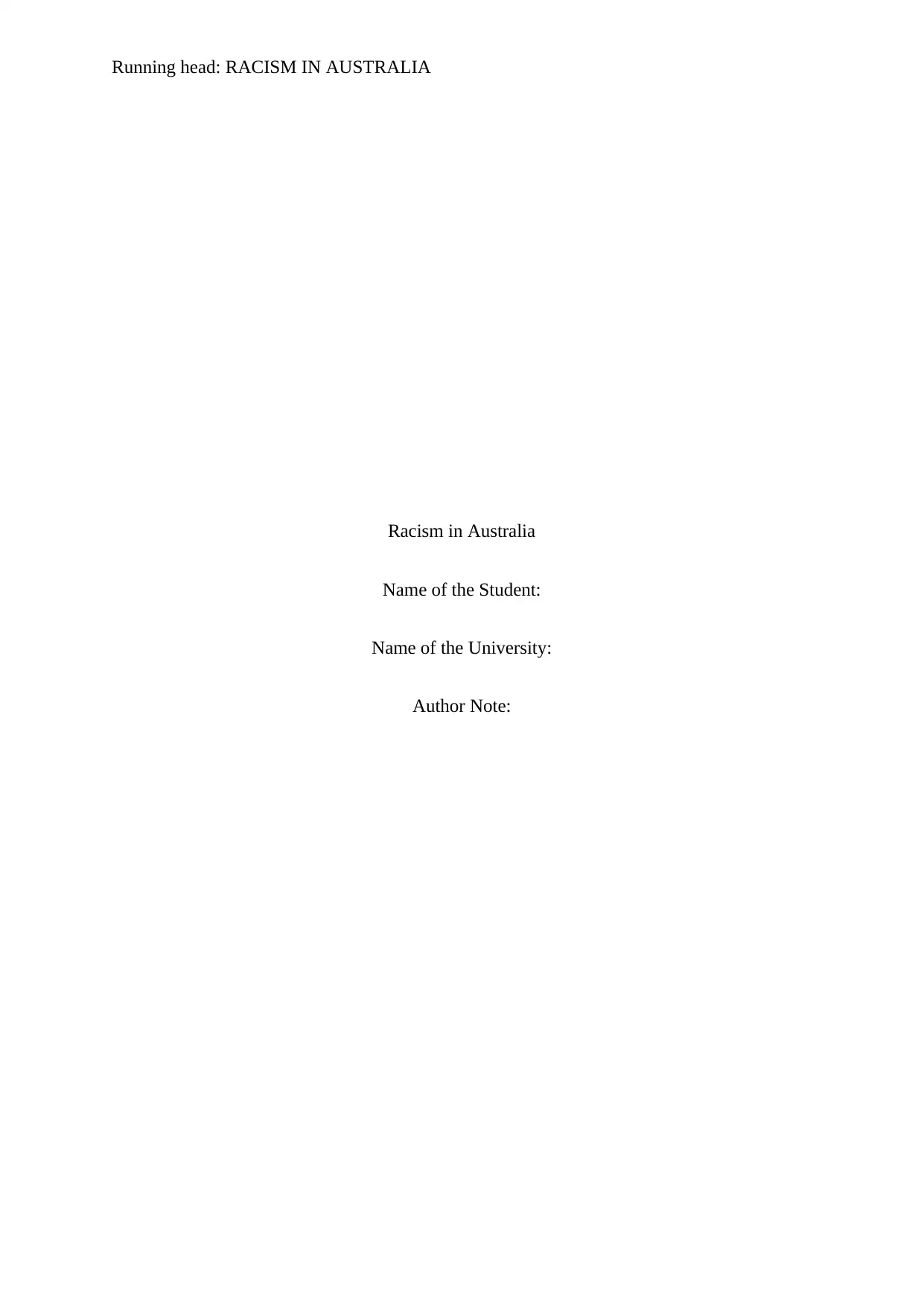
Running head: RACISM IN AUSTRALIA
Racism in Australia
Name of the Student:
Name of the University:
Author Note:
Racism in Australia
Name of the Student:
Name of the University:
Author Note:
Paraphrase This Document
Need a fresh take? Get an instant paraphrase of this document with our AI Paraphraser
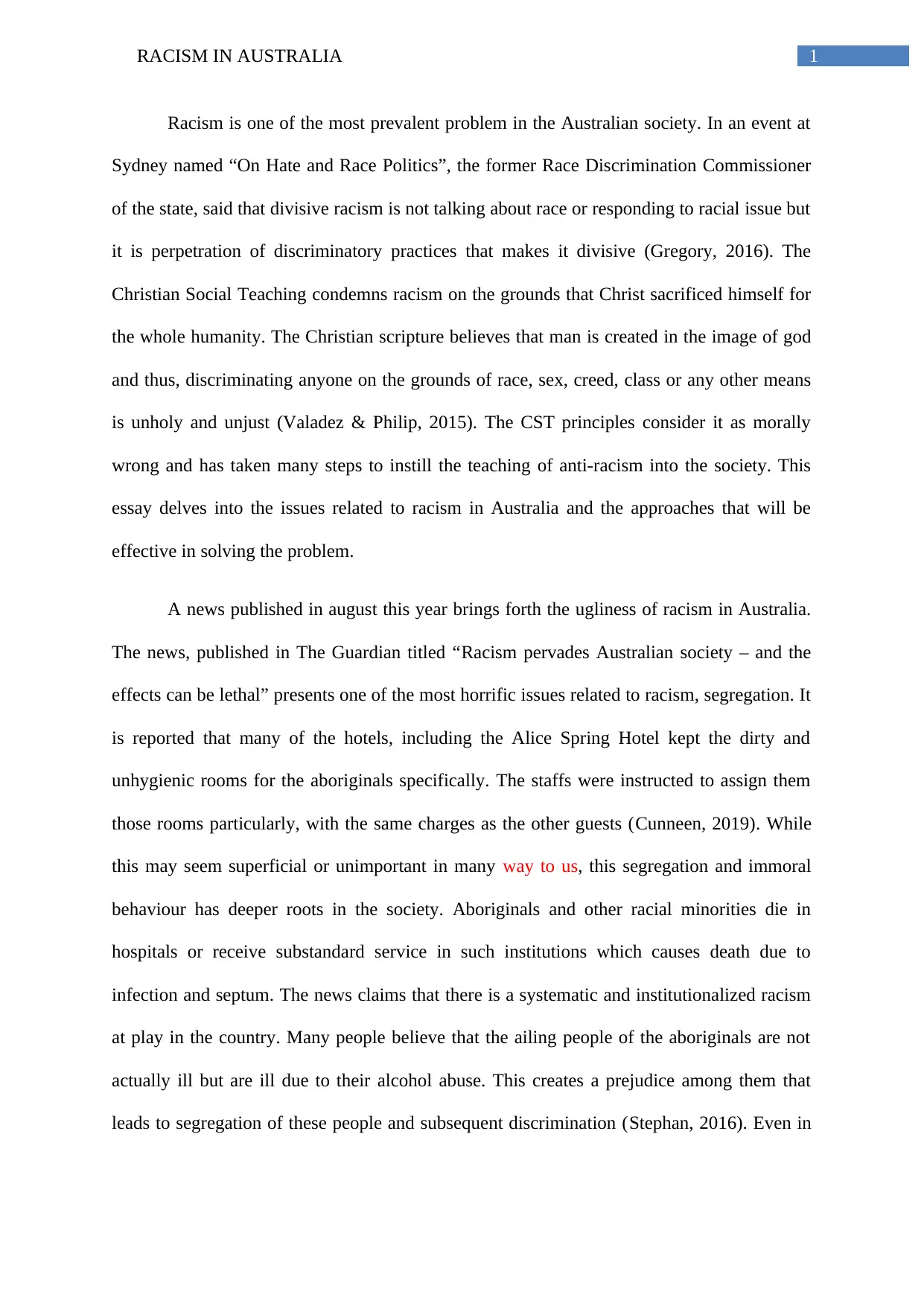
1RACISM IN AUSTRALIA
Racism is one of the most prevalent problem in the Australian society. In an event at
Sydney named “On Hate and Race Politics”, the former Race Discrimination Commissioner
of the state, said that divisive racism is not talking about race or responding to racial issue but
it is perpetration of discriminatory practices that makes it divisive (Gregory, 2016). The
Christian Social Teaching condemns racism on the grounds that Christ sacrificed himself for
the whole humanity. The Christian scripture believes that man is created in the image of god
and thus, discriminating anyone on the grounds of race, sex, creed, class or any other means
is unholy and unjust (Valadez & Philip, 2015). The CST principles consider it as morally
wrong and has taken many steps to instill the teaching of anti-racism into the society. This
essay delves into the issues related to racism in Australia and the approaches that will be
effective in solving the problem.
A news published in august this year brings forth the ugliness of racism in Australia.
The news, published in The Guardian titled “Racism pervades Australian society – and the
effects can be lethal” presents one of the most horrific issues related to racism, segregation. It
is reported that many of the hotels, including the Alice Spring Hotel kept the dirty and
unhygienic rooms for the aboriginals specifically. The staffs were instructed to assign them
those rooms particularly, with the same charges as the other guests (Cunneen, 2019). While
this may seem superficial or unimportant in many way to us, this segregation and immoral
behaviour has deeper roots in the society. Aboriginals and other racial minorities die in
hospitals or receive substandard service in such institutions which causes death due to
infection and septum. The news claims that there is a systematic and institutionalized racism
at play in the country. Many people believe that the ailing people of the aboriginals are not
actually ill but are ill due to their alcohol abuse. This creates a prejudice among them that
leads to segregation of these people and subsequent discrimination (Stephan, 2016). Even in
Racism is one of the most prevalent problem in the Australian society. In an event at
Sydney named “On Hate and Race Politics”, the former Race Discrimination Commissioner
of the state, said that divisive racism is not talking about race or responding to racial issue but
it is perpetration of discriminatory practices that makes it divisive (Gregory, 2016). The
Christian Social Teaching condemns racism on the grounds that Christ sacrificed himself for
the whole humanity. The Christian scripture believes that man is created in the image of god
and thus, discriminating anyone on the grounds of race, sex, creed, class or any other means
is unholy and unjust (Valadez & Philip, 2015). The CST principles consider it as morally
wrong and has taken many steps to instill the teaching of anti-racism into the society. This
essay delves into the issues related to racism in Australia and the approaches that will be
effective in solving the problem.
A news published in august this year brings forth the ugliness of racism in Australia.
The news, published in The Guardian titled “Racism pervades Australian society – and the
effects can be lethal” presents one of the most horrific issues related to racism, segregation. It
is reported that many of the hotels, including the Alice Spring Hotel kept the dirty and
unhygienic rooms for the aboriginals specifically. The staffs were instructed to assign them
those rooms particularly, with the same charges as the other guests (Cunneen, 2019). While
this may seem superficial or unimportant in many way to us, this segregation and immoral
behaviour has deeper roots in the society. Aboriginals and other racial minorities die in
hospitals or receive substandard service in such institutions which causes death due to
infection and septum. The news claims that there is a systematic and institutionalized racism
at play in the country. Many people believe that the ailing people of the aboriginals are not
actually ill but are ill due to their alcohol abuse. This creates a prejudice among them that
leads to segregation of these people and subsequent discrimination (Stephan, 2016). Even in
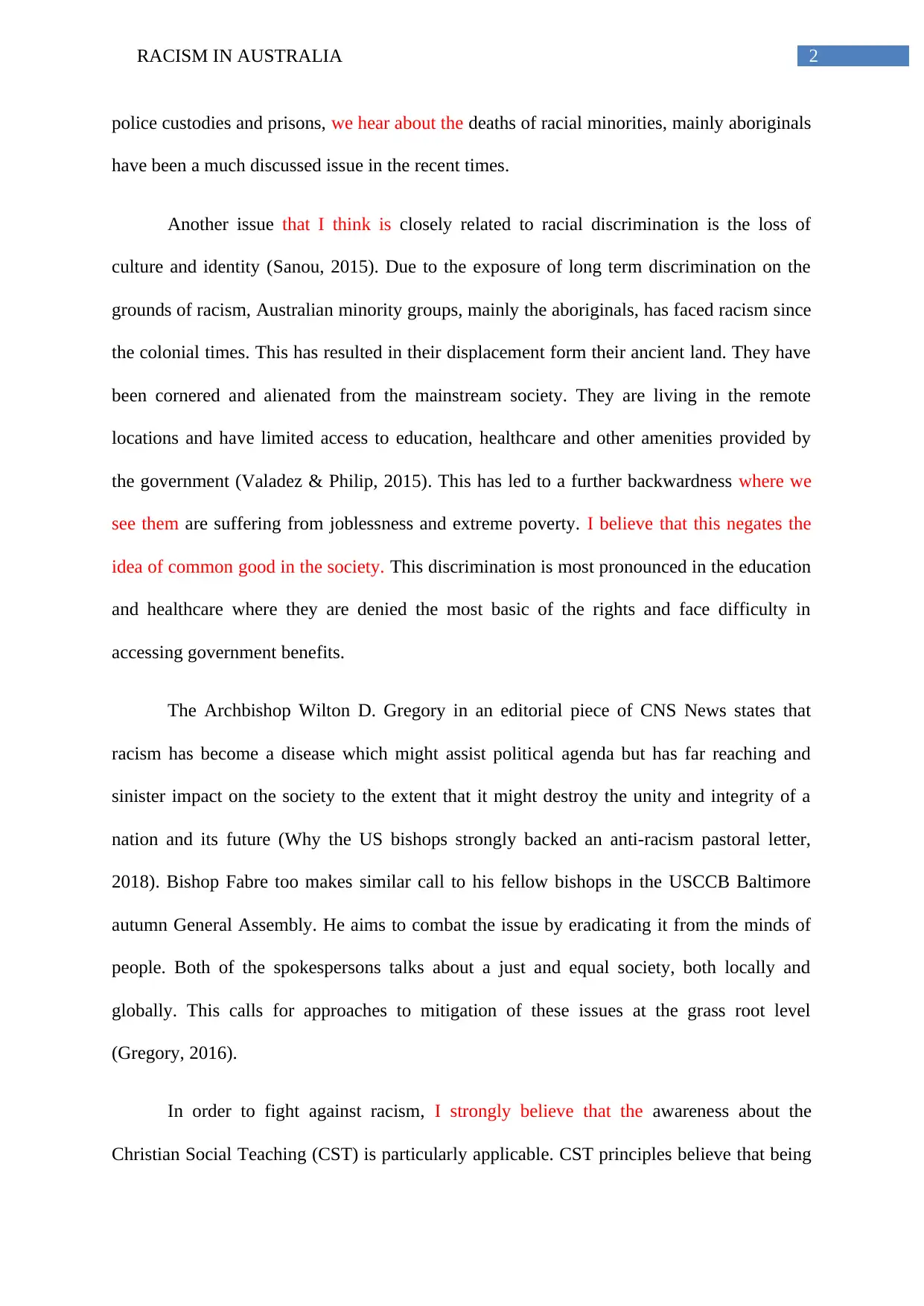
2RACISM IN AUSTRALIA
police custodies and prisons, we hear about the deaths of racial minorities, mainly aboriginals
have been a much discussed issue in the recent times.
Another issue that I think is closely related to racial discrimination is the loss of
culture and identity (Sanou, 2015). Due to the exposure of long term discrimination on the
grounds of racism, Australian minority groups, mainly the aboriginals, has faced racism since
the colonial times. This has resulted in their displacement form their ancient land. They have
been cornered and alienated from the mainstream society. They are living in the remote
locations and have limited access to education, healthcare and other amenities provided by
the government (Valadez & Philip, 2015). This has led to a further backwardness where we
see them are suffering from joblessness and extreme poverty. I believe that this negates the
idea of common good in the society. This discrimination is most pronounced in the education
and healthcare where they are denied the most basic of the rights and face difficulty in
accessing government benefits.
The Archbishop Wilton D. Gregory in an editorial piece of CNS News states that
racism has become a disease which might assist political agenda but has far reaching and
sinister impact on the society to the extent that it might destroy the unity and integrity of a
nation and its future (Why the US bishops strongly backed an anti-racism pastoral letter,
2018). Bishop Fabre too makes similar call to his fellow bishops in the USCCB Baltimore
autumn General Assembly. He aims to combat the issue by eradicating it from the minds of
people. Both of the spokespersons talks about a just and equal society, both locally and
globally. This calls for approaches to mitigation of these issues at the grass root level
(Gregory, 2016).
In order to fight against racism, I strongly believe that the awareness about the
Christian Social Teaching (CST) is particularly applicable. CST principles believe that being
police custodies and prisons, we hear about the deaths of racial minorities, mainly aboriginals
have been a much discussed issue in the recent times.
Another issue that I think is closely related to racial discrimination is the loss of
culture and identity (Sanou, 2015). Due to the exposure of long term discrimination on the
grounds of racism, Australian minority groups, mainly the aboriginals, has faced racism since
the colonial times. This has resulted in their displacement form their ancient land. They have
been cornered and alienated from the mainstream society. They are living in the remote
locations and have limited access to education, healthcare and other amenities provided by
the government (Valadez & Philip, 2015). This has led to a further backwardness where we
see them are suffering from joblessness and extreme poverty. I believe that this negates the
idea of common good in the society. This discrimination is most pronounced in the education
and healthcare where they are denied the most basic of the rights and face difficulty in
accessing government benefits.
The Archbishop Wilton D. Gregory in an editorial piece of CNS News states that
racism has become a disease which might assist political agenda but has far reaching and
sinister impact on the society to the extent that it might destroy the unity and integrity of a
nation and its future (Why the US bishops strongly backed an anti-racism pastoral letter,
2018). Bishop Fabre too makes similar call to his fellow bishops in the USCCB Baltimore
autumn General Assembly. He aims to combat the issue by eradicating it from the minds of
people. Both of the spokespersons talks about a just and equal society, both locally and
globally. This calls for approaches to mitigation of these issues at the grass root level
(Gregory, 2016).
In order to fight against racism, I strongly believe that the awareness about the
Christian Social Teaching (CST) is particularly applicable. CST principles believe that being
⊘ This is a preview!⊘
Do you want full access?
Subscribe today to unlock all pages.

Trusted by 1+ million students worldwide
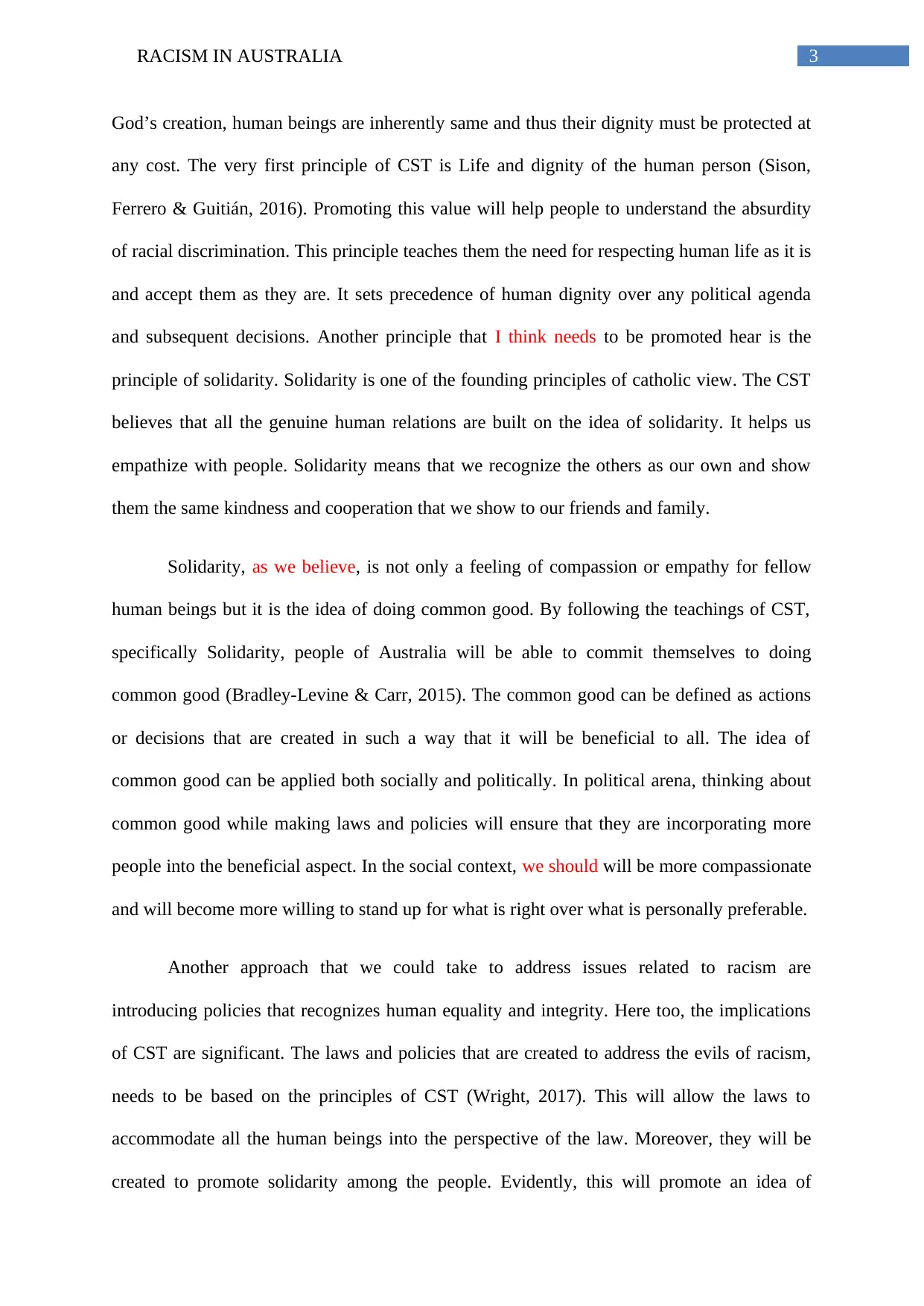
3RACISM IN AUSTRALIA
God’s creation, human beings are inherently same and thus their dignity must be protected at
any cost. The very first principle of CST is Life and dignity of the human person (Sison,
Ferrero & Guitián, 2016). Promoting this value will help people to understand the absurdity
of racial discrimination. This principle teaches them the need for respecting human life as it is
and accept them as they are. It sets precedence of human dignity over any political agenda
and subsequent decisions. Another principle that I think needs to be promoted hear is the
principle of solidarity. Solidarity is one of the founding principles of catholic view. The CST
believes that all the genuine human relations are built on the idea of solidarity. It helps us
empathize with people. Solidarity means that we recognize the others as our own and show
them the same kindness and cooperation that we show to our friends and family.
Solidarity, as we believe, is not only a feeling of compassion or empathy for fellow
human beings but it is the idea of doing common good. By following the teachings of CST,
specifically Solidarity, people of Australia will be able to commit themselves to doing
common good (Bradley-Levine & Carr, 2015). The common good can be defined as actions
or decisions that are created in such a way that it will be beneficial to all. The idea of
common good can be applied both socially and politically. In political arena, thinking about
common good while making laws and policies will ensure that they are incorporating more
people into the beneficial aspect. In the social context, we should will be more compassionate
and will become more willing to stand up for what is right over what is personally preferable.
Another approach that we could take to address issues related to racism are
introducing policies that recognizes human equality and integrity. Here too, the implications
of CST are significant. The laws and policies that are created to address the evils of racism,
needs to be based on the principles of CST (Wright, 2017). This will allow the laws to
accommodate all the human beings into the perspective of the law. Moreover, they will be
created to promote solidarity among the people. Evidently, this will promote an idea of
God’s creation, human beings are inherently same and thus their dignity must be protected at
any cost. The very first principle of CST is Life and dignity of the human person (Sison,
Ferrero & Guitián, 2016). Promoting this value will help people to understand the absurdity
of racial discrimination. This principle teaches them the need for respecting human life as it is
and accept them as they are. It sets precedence of human dignity over any political agenda
and subsequent decisions. Another principle that I think needs to be promoted hear is the
principle of solidarity. Solidarity is one of the founding principles of catholic view. The CST
believes that all the genuine human relations are built on the idea of solidarity. It helps us
empathize with people. Solidarity means that we recognize the others as our own and show
them the same kindness and cooperation that we show to our friends and family.
Solidarity, as we believe, is not only a feeling of compassion or empathy for fellow
human beings but it is the idea of doing common good. By following the teachings of CST,
specifically Solidarity, people of Australia will be able to commit themselves to doing
common good (Bradley-Levine & Carr, 2015). The common good can be defined as actions
or decisions that are created in such a way that it will be beneficial to all. The idea of
common good can be applied both socially and politically. In political arena, thinking about
common good while making laws and policies will ensure that they are incorporating more
people into the beneficial aspect. In the social context, we should will be more compassionate
and will become more willing to stand up for what is right over what is personally preferable.
Another approach that we could take to address issues related to racism are
introducing policies that recognizes human equality and integrity. Here too, the implications
of CST are significant. The laws and policies that are created to address the evils of racism,
needs to be based on the principles of CST (Wright, 2017). This will allow the laws to
accommodate all the human beings into the perspective of the law. Moreover, they will be
created to promote solidarity among the people. Evidently, this will promote an idea of
Paraphrase This Document
Need a fresh take? Get an instant paraphrase of this document with our AI Paraphraser
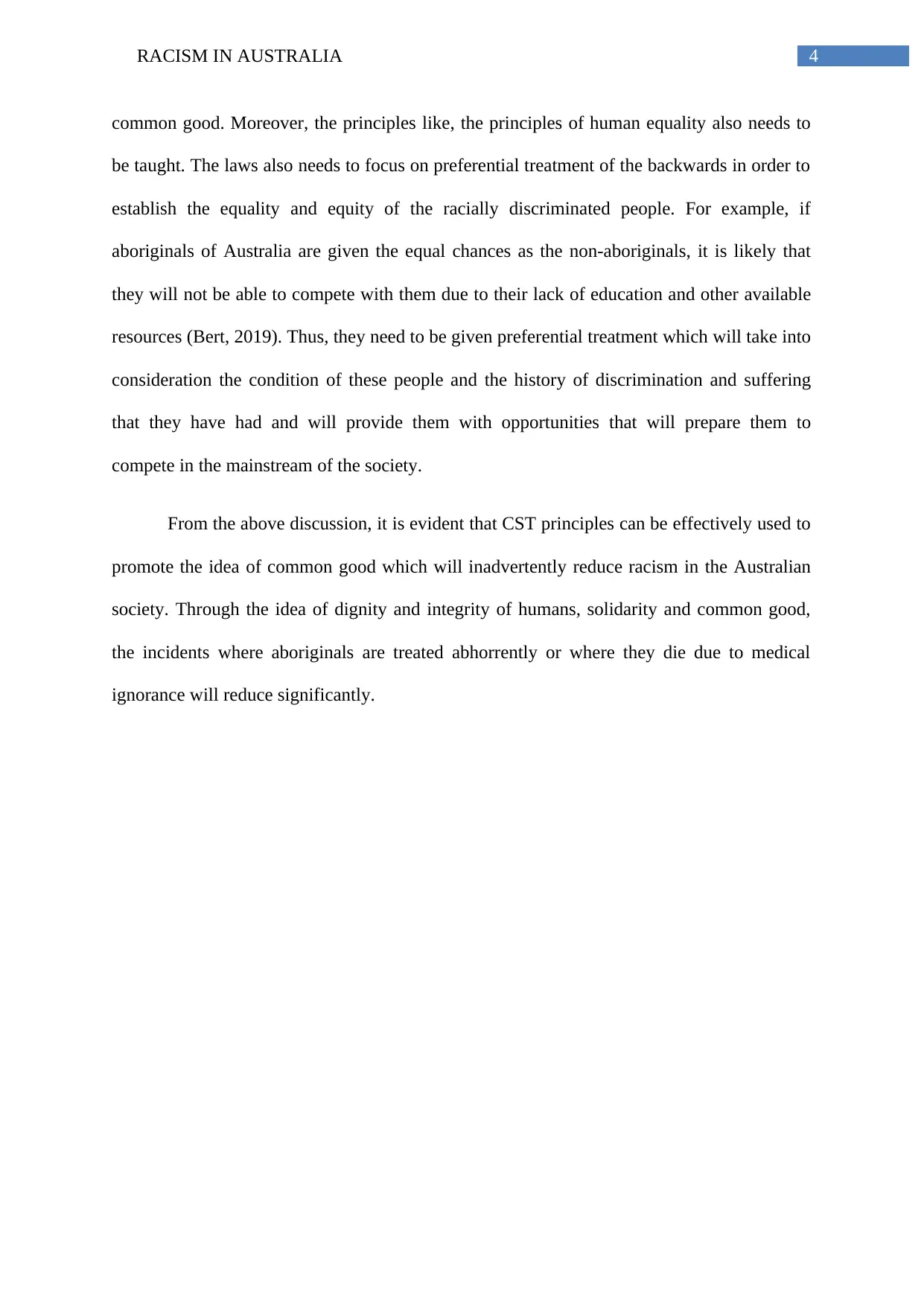
4RACISM IN AUSTRALIA
common good. Moreover, the principles like, the principles of human equality also needs to
be taught. The laws also needs to focus on preferential treatment of the backwards in order to
establish the equality and equity of the racially discriminated people. For example, if
aboriginals of Australia are given the equal chances as the non-aboriginals, it is likely that
they will not be able to compete with them due to their lack of education and other available
resources (Bert, 2019). Thus, they need to be given preferential treatment which will take into
consideration the condition of these people and the history of discrimination and suffering
that they have had and will provide them with opportunities that will prepare them to
compete in the mainstream of the society.
From the above discussion, it is evident that CST principles can be effectively used to
promote the idea of common good which will inadvertently reduce racism in the Australian
society. Through the idea of dignity and integrity of humans, solidarity and common good,
the incidents where aboriginals are treated abhorrently or where they die due to medical
ignorance will reduce significantly.
common good. Moreover, the principles like, the principles of human equality also needs to
be taught. The laws also needs to focus on preferential treatment of the backwards in order to
establish the equality and equity of the racially discriminated people. For example, if
aboriginals of Australia are given the equal chances as the non-aboriginals, it is likely that
they will not be able to compete with them due to their lack of education and other available
resources (Bert, 2019). Thus, they need to be given preferential treatment which will take into
consideration the condition of these people and the history of discrimination and suffering
that they have had and will provide them with opportunities that will prepare them to
compete in the mainstream of the society.
From the above discussion, it is evident that CST principles can be effectively used to
promote the idea of common good which will inadvertently reduce racism in the Australian
society. Through the idea of dignity and integrity of humans, solidarity and common good,
the incidents where aboriginals are treated abhorrently or where they die due to medical
ignorance will reduce significantly.
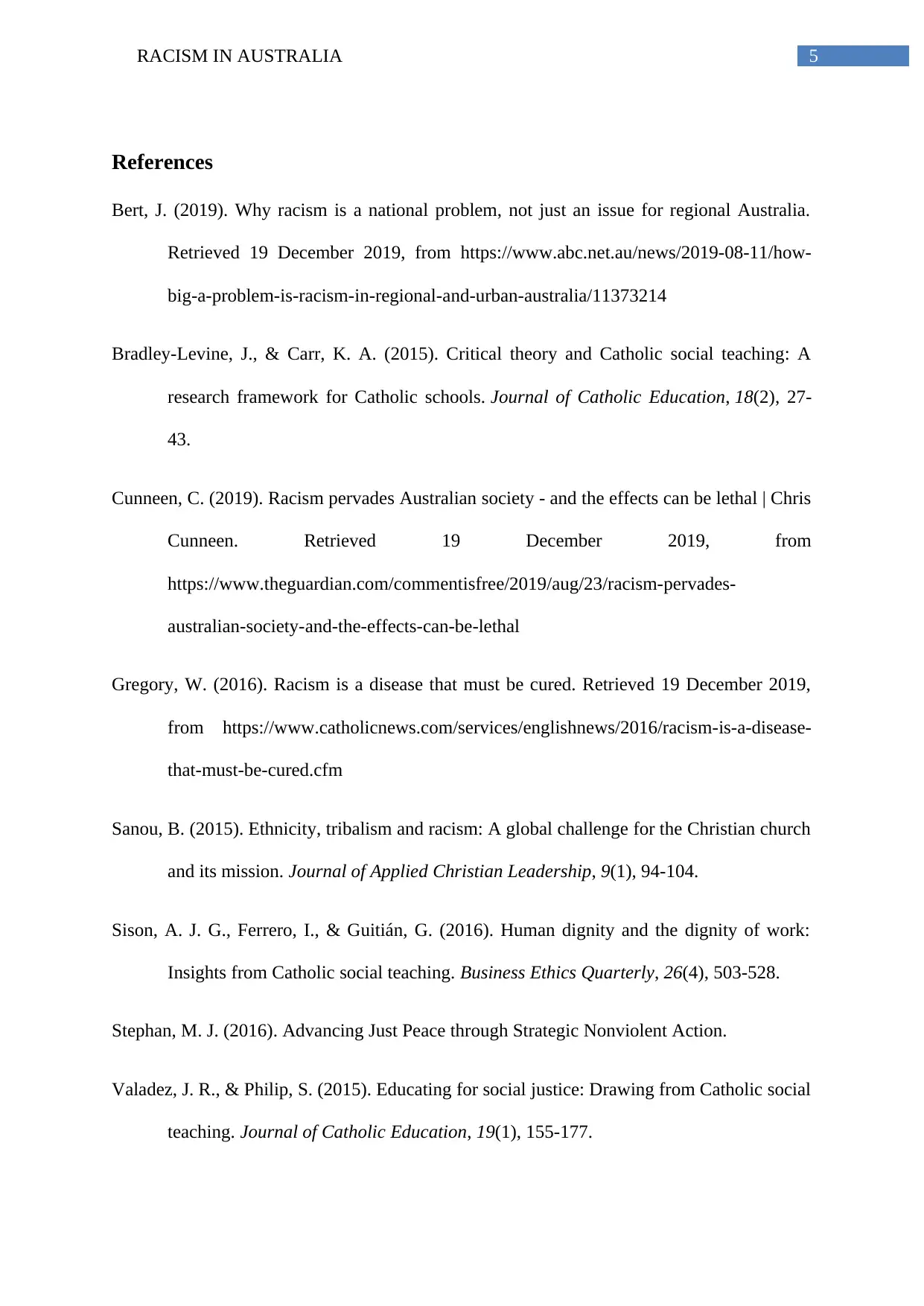
5RACISM IN AUSTRALIA
References
Bert, J. (2019). Why racism is a national problem, not just an issue for regional Australia.
Retrieved 19 December 2019, from https://www.abc.net.au/news/2019-08-11/how-
big-a-problem-is-racism-in-regional-and-urban-australia/11373214
Bradley-Levine, J., & Carr, K. A. (2015). Critical theory and Catholic social teaching: A
research framework for Catholic schools. Journal of Catholic Education, 18(2), 27-
43.
Cunneen, C. (2019). Racism pervades Australian society - and the effects can be lethal | Chris
Cunneen. Retrieved 19 December 2019, from
https://www.theguardian.com/commentisfree/2019/aug/23/racism-pervades-
australian-society-and-the-effects-can-be-lethal
Gregory, W. (2016). Racism is a disease that must be cured. Retrieved 19 December 2019,
from https://www.catholicnews.com/services/englishnews/2016/racism-is-a-disease-
that-must-be-cured.cfm
Sanou, B. (2015). Ethnicity, tribalism and racism: A global challenge for the Christian church
and its mission. Journal of Applied Christian Leadership, 9(1), 94-104.
Sison, A. J. G., Ferrero, I., & Guitián, G. (2016). Human dignity and the dignity of work:
Insights from Catholic social teaching. Business Ethics Quarterly, 26(4), 503-528.
Stephan, M. J. (2016). Advancing Just Peace through Strategic Nonviolent Action.
Valadez, J. R., & Philip, S. (2015). Educating for social justice: Drawing from Catholic social
teaching. Journal of Catholic Education, 19(1), 155-177.
References
Bert, J. (2019). Why racism is a national problem, not just an issue for regional Australia.
Retrieved 19 December 2019, from https://www.abc.net.au/news/2019-08-11/how-
big-a-problem-is-racism-in-regional-and-urban-australia/11373214
Bradley-Levine, J., & Carr, K. A. (2015). Critical theory and Catholic social teaching: A
research framework for Catholic schools. Journal of Catholic Education, 18(2), 27-
43.
Cunneen, C. (2019). Racism pervades Australian society - and the effects can be lethal | Chris
Cunneen. Retrieved 19 December 2019, from
https://www.theguardian.com/commentisfree/2019/aug/23/racism-pervades-
australian-society-and-the-effects-can-be-lethal
Gregory, W. (2016). Racism is a disease that must be cured. Retrieved 19 December 2019,
from https://www.catholicnews.com/services/englishnews/2016/racism-is-a-disease-
that-must-be-cured.cfm
Sanou, B. (2015). Ethnicity, tribalism and racism: A global challenge for the Christian church
and its mission. Journal of Applied Christian Leadership, 9(1), 94-104.
Sison, A. J. G., Ferrero, I., & Guitián, G. (2016). Human dignity and the dignity of work:
Insights from Catholic social teaching. Business Ethics Quarterly, 26(4), 503-528.
Stephan, M. J. (2016). Advancing Just Peace through Strategic Nonviolent Action.
Valadez, J. R., & Philip, S. (2015). Educating for social justice: Drawing from Catholic social
teaching. Journal of Catholic Education, 19(1), 155-177.
⊘ This is a preview!⊘
Do you want full access?
Subscribe today to unlock all pages.

Trusted by 1+ million students worldwide
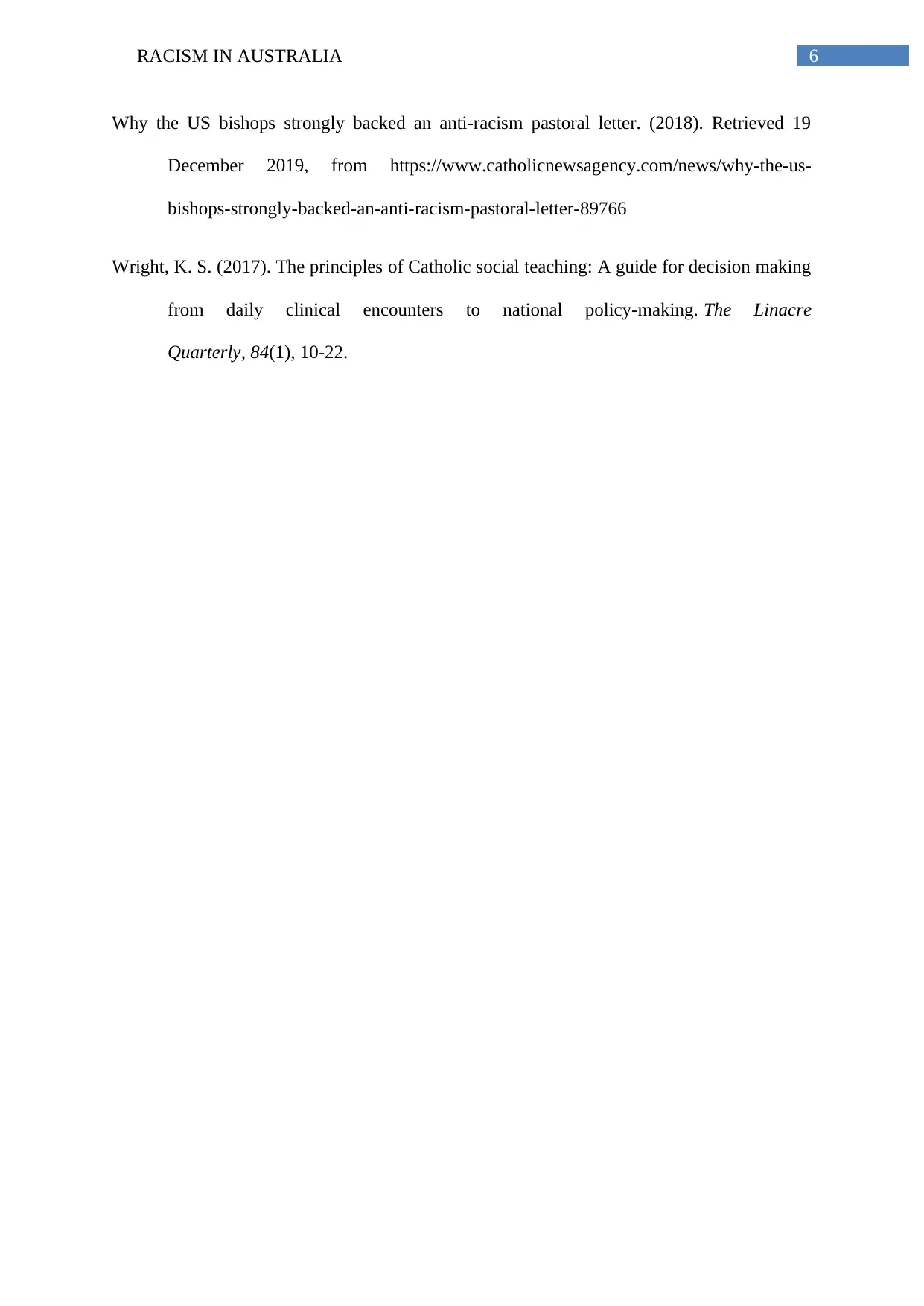
6RACISM IN AUSTRALIA
Why the US bishops strongly backed an anti-racism pastoral letter. (2018). Retrieved 19
December 2019, from https://www.catholicnewsagency.com/news/why-the-us-
bishops-strongly-backed-an-anti-racism-pastoral-letter-89766
Wright, K. S. (2017). The principles of Catholic social teaching: A guide for decision making
from daily clinical encounters to national policy-making. The Linacre
Quarterly, 84(1), 10-22.
Why the US bishops strongly backed an anti-racism pastoral letter. (2018). Retrieved 19
December 2019, from https://www.catholicnewsagency.com/news/why-the-us-
bishops-strongly-backed-an-anti-racism-pastoral-letter-89766
Wright, K. S. (2017). The principles of Catholic social teaching: A guide for decision making
from daily clinical encounters to national policy-making. The Linacre
Quarterly, 84(1), 10-22.
1 out of 7
Your All-in-One AI-Powered Toolkit for Academic Success.
+13062052269
info@desklib.com
Available 24*7 on WhatsApp / Email
![[object Object]](/_next/static/media/star-bottom.7253800d.svg)
Unlock your academic potential
Copyright © 2020–2026 A2Z Services. All Rights Reserved. Developed and managed by ZUCOL.
